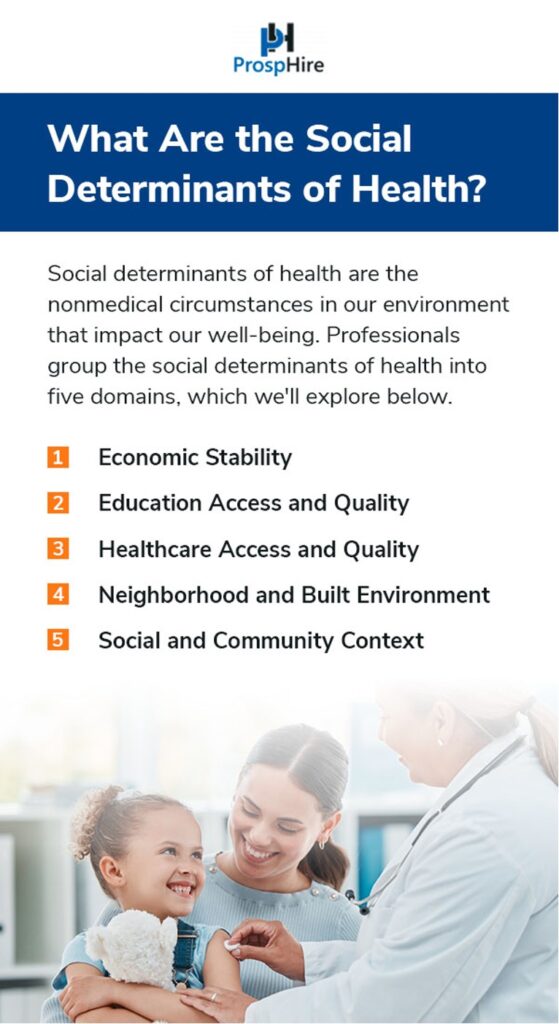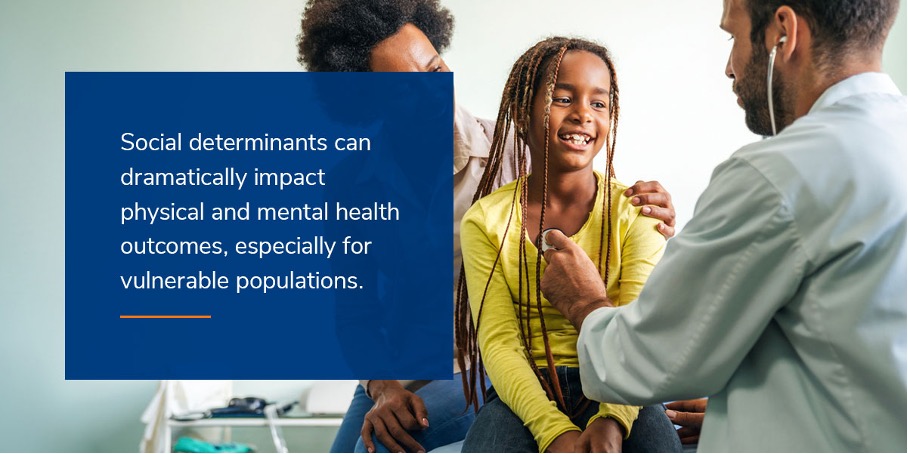
What Are Social Determinants of Health and Why Are They Important in Healthcare?
Jump to:
- What Are the Social Determinants of Health?
- The Impact of Social Determinants of Health
- The Truth About Negative Social Determinants of Health
- How ProspHire Can Help
- Let ProspHire Help You Address Social Determinants of Health
Imagine a world in which every person, from infants to seniors, can achieve and maintain their highest level of health. This goal is health equity and while it should be a societal norm, many obstacles make it difficult to reach.
These barriers lead to health disparities, which are differences in the health statuses of varying groups of people. Health disparities are avoidable distinctions in the burden of illness, injury, disease, violence or chances to attain good health that socially disadvantaged groups face.
Health inequities are linked closely to the disproportionate allocation of social, economic and environmental resources. However, health professionals can work to address these disparities by understanding why social health determinants are important and what support services can help.

What Are 5 Social Determinants of Health?
Social determinants of health are the nonmedical circumstances in our environment that impact our well-being. Factors present in the places where we are born, live, play, learn, work, and age can profoundly influence our overall quality of life.
Social determinants of health also cover a broader set of systems and forces that shape daily life. These health determinants can comprise economic policies, development agendas, social and cultural norms, racism, climate change and politics.
To understand social determinants of health, consider the following examples:
- Safe housing, transportation and neighborhoods
- Discrimination, racism and violence
- Education, job opportunities and income
- Access to nutritious foods and opportunities for physical exercise
- Clean air and water
- Language and literacy skills
Professionals group the social determinants of health into five domains, which we’ll explore below.
1. Economic Stability
Economic stability means having enough secure, reliable income to meet your fundamental needs. Being economically stable can help you achieve a better quality of life by allowing you to access essential resources for your health and well-being.
Factors that influence economic stability include:
- Affordable housing
- Employment that provides a living wage
- Employment benefits, like worker protections, paid sick leave and child care
- Reliable transportation
It’s crucial to address economic instability as a social determinant of health because daily challenges surrounding unemployment, poverty, housing and food insecurity can elevate the risk of poor health outcomes for vulnerable populations.

2. Education Access and Quality
Education equips people with the tools they need to live fulfilling lives, thrive personally and contribute to their communities. Moreover, an educated person is more likely to access elements that contribute to their well-being, like quality healthcare, jobs that pay a living wage and safe living environments.
People with access to a good education tend to stay healthier throughout their lives than those without. Education gives people the opportunity for upward mobility, placing them in the financial circumstances necessary to access quality healthcare and support services.
People with low education levels contend with unemployment and low income, which are associated with poorer health. Data indicates that people of lower socioeconomic status experience more health problems like obesity, asthma, diabetes and heart disease than people of higher socioeconomic status.
Finally, having a college education helps job seekers obtain higher-paying work that poses fewer safety risks.
Ultimately, people with higher levels of education have more means to afford things that promote their health, like quality housing in toxin-free environments and expert primary care physicians trained in the most successful techniques.
3. Healthcare Access and Quality
Access to quality healthcare means services like the prevention, diagnosis, treatment and management of diseases, illnesses, disorders and other health-impacting conditions are readily available to you. These healthcare services must also be affordable and convenient.
Unfortunately, many people encounter obstacles that make it challenging to obtain health care services, which may increase the risk of poor health outcomes and disparities. Such barriers include a lack of health insurance, inadequate healthcare resources and limited access to transportation.
Little or no health insurance coverage significantly hinders healthcare access. High costs may cause people to put off necessary medical treatment or avoid it altogether. Lower-income families often go without insurance and minority groups constitute over half of the uninsured population.
Inadequate health insurance coverage can adversely impact a person’s health. Adults without insurance are less likely to receive preventive care for chronic conditions like diabetes, cancer and heart disease. Likewise, uninsured children are less likely to get treated for conditions like asthma or receive critical services like dental care, immunizations and well-child visits.
Sometimes, a limited availability of resources and support services further reduces people’s access to health services, increasing the likelihood of adverse health outcomes. For example, a shortage of doctors and primary care providers may mean patients wait longer to receive care.
Unreliable or inconvenient transportation can also make it difficult for people to receive consistent healthcare, potentially contributing to adverse health outcomes.
4. Neighborhood and Built Environment
The neighborhoods and built environments in which people live, work, play and learn can strongly influence their health and well-being for better or worse, depending on the circumstances.
Many people live in communities or work in jobs that present health risks like high rates of violence, pollution, unsafe water and others. Minorities and low-income people are more likely to live in neighborhoods and work in environments that present these risks.
The factors that make neighborhoods and built environments a social determinant of health fall into the following four groups.
- Access to healthy foods: Access to nutritious foods is crucial to a sensible eating pattern. A lack of access to healthy foods can result in malnutrition, higher obesity levels and other diet-related conditions because low-income people tend to live in “food deserts.” However, accessing healthy food depends on more than having a grocery store nearby. People must also be able to afford it and affordability closely relates to employment rates and job quality.
- Quality of housing: A home’s design and structure can significantly impact housing quality. Unsafe conditions such as the presence of asbestos, mold, lead, substandard air quality and overcrowding can lead to adverse physical and mental health outcomes.
- Crime and violence: Whether experienced directly or indirectly, crime and violence can cause injury, mental distress and reduced quality of life. Some communities and groups are more likely to encounter crime and violence than others, such as low-income neighborhoods and Black adolescents.
- Environmental conditions: Environmental conditions like water quality, air quality and the weather can influence a person’s health. Some groups are more vulnerable to poor environmental conditions and their associated health disparities. These include people of color, low-income families, the homeless, the elderly, pregnant women and children.
5. Social and Community Context
Social and community situations are vital aspects of a person’s health status. Relationships and interactions between people and their family, friends, colleagues and community can shape their health priorities and well-being.
Public health advocates classify social and community contexts into the following four categories.
- Civic participation: Civic participation comprises activities like voting, volunteering, recreational sports, community gardening and more. Civic participation benefits the community and the participants by building social capital, expanding social networks and helping foster a sense of purpose.
- Discrimination: Discrimination is a stressor that affects a person’s health by barring access to resources, dignity and quality of life.
- Incarceration: People are more likely to develop chronic conditions like high blood pressure, cancer, asthma and arthritis. Black and Hispanic populations and people with low education levels have higher incarceration rates.
- Social cohesion: Relationships are an essential part of physical and psychosocial wellness. Social cohesion is the strength of relationships and the perception of harmony within a community. High levels can positively influence health outcomes.

The Impact of Social Determinants of Health in Patients
Social determinants can dramatically impact physical and mental health outcomes, especially for vulnerable populations. Providers must account for circumstances like patient income, education and environment to deliver the holistic care necessary for health equity and well-being.
The public health sphere widely understands that poverty impedes access to nutritious foods and safe neighborhoods, and that higher educational levels contribute to better overall health.
If means are available to overcome adverse social determinants of health, populations can experience better health. But without resources, social determinants can foster troublesome circumstances like discrimination and disparities. Moreover, undesirable social health determinants can affect a person’s knowledge of healthcare and resources and restrict access to them.
The Truth About Negative Social Determinants of Health
Health studies have indicated that:
- Children of adults who did not earn a high school diploma are more likely to grow up in areas with barriers to healthcare and health topics.
- As income levels decrease, the risk of premature death increases.
- There is a direct connection between lower income, smoking and shorter life expectancy.
- Poor white people are less likely to live in neighborhoods of concentrated poverty.
- A person’s living environment may influence that of future generations.
- Disparity-related stress relates to health and is often the result of overlapping factors.
- Stress harms children and adults throughout their lives. Repeated exposure to environmental and social stressors may result in a cumulative burden that puts people’s health at risk.
Social determinants that result in health disparities are expensive and can hinder the quality of care that people receive, leading to additional healthcare expenditures, loss of efficiency and early death.
Research related to the price of health disparities puts the situation into perspective. For Black people, Hispanics and Asian Americans, 30% of direct medical costs relate to health inequities. On a broader scale, the U.S. loses approximately $309 billion each year to the direct and indirect costs of health disparities.

How ProspHire Can Help You Provide Quality Patient Care
As our population diversifies, it becomes more vulnerable to the concerns associated with adverse social determinants of health. One straightforward path to addressing this issue is coordinating services across the spectrum of care. Merging social support and assistance with healthcare delivery is vital for providers to confront the various social determinants that have such a bearing on patients’ wellness.
ProspHire prioritizes helping you provide high-quality healthcare to your patients, and we tailor solutions to do that. We understand the far-reaching effects that nonmedical factors have on a person’s health, so we’ve implemented strategies to help healthcare professionals address them.
Below are the services we offer related to social determinants of health.
- SDoH solutions: These solutions allow you to look beyond the point of care and address all areas that impact health outcomes, such as housing, food insecurity, transportation and improving access to needed community programs.
- Population health assessment and transformation: Assess your population, understand the underlying drivers of health and implement change to address social determinants and equitable health outcomes through turnkey interventions.
- Organizational strategic planning: Drive organizational transformation through defined goals and a developed playbook for change management and actionable strategies to address health disparities.
- Community-based partnership development: Evaluate, align and partner with community-based organizations to address social determinants and close care gaps to improve equitable outcomes and increase community-based care management.
- Maternal health equity: Address inequities and improve outcomes in maternal health through population-based interventions and recommendations curated to meet the needs of vulnerable patients and members.
- Quality accreditation achievement: Be a leader in the industry through the pursuit and award of health equity and other quality accreditations.
With these services, health providers can build a more comprehensive awareness of the biological, behavioral and social components that shape wellness and health systems. The result is an equitable healthcare system that makes better health outcomes attainable for everyone.

Address Social Determinants of Health with ProspHire
Tackling the challenges presented by negative social determinants of health is no small undertaking, but patients deserve your best effort. A multifaceted approach is necessary to make the changes that will allow our society to find health equity. ProspHire has the expertise and enthusiasm to develop a solid plan for your organization.
ProspHire helps our clients provide better access to quality healthcare. We’re here to help you implement the strategies and interventions needed to fight health disparities and achieve health equity.
With our commitment to culture, leadership, diversity, equity and inclusion, our minority-owned business is a leader in healthcare strategy and execution. Contact the experts at ProspHire today to learn more.
Let’s have a conversation
ProspHire
216 Blvd of the Allies, Sixth Floor
Pittsburgh, PA 15222
prosper@prosphire.com


© 2025 ProspHire, LLC. All Rights Reserved / Terms of Use / Privacy Policy







